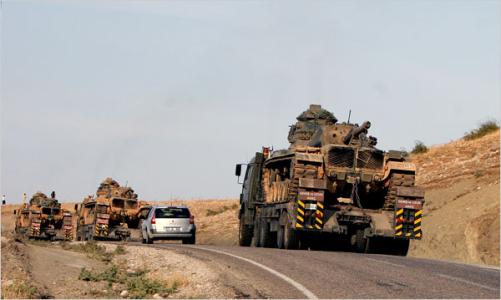After about three hours, through my night vision goggles I saw a pickup truck exiting the village.
大概三小時后,通過夜視鏡我看到一個小卡車駛出了村莊。
This wasn’t all that unusual in itself, but the vehicle was traveling across the field, not on the road, with no lights on.
這本身并不奇怪,但是這個機車的燈是關著的,它沒有在路上行駛,而是穿過田野過去的。
Naturally, this twitched my mental antennae. The vehicle was a little over a mile away and heading in our direction.
自然地,這觸動了我的神經。這個機車在位于距我們一公里多一點的地方,正朝著我們的方向行進。
Over the intercom, I let the vehicle commander know that we had company incoming.
我在對講機上告訴車輛指揮官有車輛開過來了。
He passed the word to the platoon sergeant, who passed it to the platoon leader, who was on the ground near the IED.
他將這一消息告訴副排長,而后副排長把消息告訴了排長,排長在靠近建議爆炸裝置的地面上。
At about 1,500 meters, the order was given to me: "If they get within 300 meters, engage at your discretion."
在距我們大概1500米的時候,我接到了命令:“如果他們到了300米以內,自行決定行動。”
It was that simple. No warning shots, no flares, no second chances. Waiting for the vehicle to approach the 300-meter mark was the longest 15 minutes of my life.
命令非常簡單。沒有鳴槍警告,沒有信號彈,沒有第二次機會。等待那個機車靠近300米標記的時間是我人生中最漫長的15分鐘。
"At your discretion" wasn't something I heard very often as a 21-year-old specialist.
對于一個21歲的特種兵來說,“自行決定”并不是經常能聽到的話語。
I was being given the power of life and death over the occupants of that truck, and they didn't even know it.
我被賦予了決定那個卡車上的人們的生與死的權利,而且車上的人甚至都不知道。
My brain raced. Are these insurgents? What if they are doing farmwork in the middle of the night? (Not that uncommon in a desert country.)
我的大腦快速運轉。這些人是叛亂分子嗎?萬一他們是半夜出來做農活的人呢?(這在沙漠國家并不罕見)。
What if they are driving off-road to avoid the insurgents and IEDs they fear may be on the road?
如果他們是在越野行駛,以避開他們擔心路上可能有的叛亂分子和簡易爆炸裝置怎么辦?
What if it's some guy taking a family member to the hospital? What if they are insurgents and the truck explodes when I shoot it?
如果那是某個家伙載著家人去往醫院的車呢?如果他們是叛亂分子,在我開槍的時候卡車爆炸了怎么辦?

Hopefully 300 meters is far enough away... But what played through my mind, over and over, was a lesson my father had taught me ten years before:
希望300米是足夠遠的地方,但是我腦海中反復播放的是父親十年前給我上的一課:
When you pull the trigger, the consequences are yours—forever.
當你扣動扳機的時候,你將永遠對它造成的后果負責。
When I was a boy in Sandwich, Massachusetts, I became interested in firearms and hunting and asked my father to take me shooting.
當我還是馬薩諸塞州桑威奇市的一個男孩時,我對槍支和打獵產生了興趣,并請父親帶我去打獵。
After some haggling with Mom, he agreed. I remember sitting down at the dining room table prior to heading to the range.
父親和母親爭論了一番后,同意了我的請求。我記得去牧場之前,我坐在餐桌旁。
He had removed some rifles from the safe in the basement and instructed me on their proper handling.
父親從地下室的保險柜里取出了一些步槍,并指導我正確使用。
After I gained his confidence, he fixed me with his loving, firm gaze and said, "I'm going to tell you something very simple but very important.
當我贏得父親的信任后,他用充滿愛意的堅定目光注視著我說:“我要告訴你一件非常簡單但非常重要的事情。
You can't take a bullet back once you pull the trigger." I smiled and said, "Yeah, Dad, I know." He didn’t even blink.
一旦你扣動扳機,子彈就回不來了。”我笑著說,“好的,父親,我知道了。”他甚至都沒有眨眼。
"No, you don't. I mean this. You can't take a bullet back. Once you pull the trigger, it's forever.
“不,你不知道。我是認真的。你不能讓子彈回來,一旦你扣動扳機,事情就已成定局。
It's not a movie; it's not a video game. No matter how many times you say 'I'm sorry,' 'It was an accident,' 'I didn't mean to,' that bullet Never. Comes. Back.
這不是電影,也不是游戲。不管你說多少次的“我很抱歉”,“那是一次意外”,“我不是故意的”,那顆子彈永遠不會再回來了。
Do you understand?" He reached out and squeezed my shoulder.
你明白嗎?”他伸手捏了捏我的肩膀。



